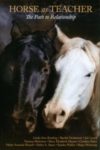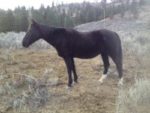Posts Tagged ‘Healing Horses Naturally’
Holistic Horse Health: Is Stress Affecting Your Horse’s Liver? (Part 3)
See below for more thoughts from Madalyn Ward, DVM, on the topic of stress and how it affects a horse’s liver function.
~~~~~~~~~~~~~~~~~~~~~~~~~~~~~~~~~~~~~~~~~~~~~~~~~~~~~~~~~~~~~~~~~~~~~~~~
Solutions for Coping with Stress
High chlorophyll foods such and blue green algae have a protective and cleansing effect on liver tissue. Blue green algae and sprouted greens are also high in natural antioxidants which aid the liver in detoxifying the body.
Certain nutritional mushrooms such as Maitake, Poria, Reishi and Cordyceps aid the liver by helping to lower sugar levels in the blood. Green foods in combination with nutritional mushrooms and spouted greens support the liver and kidneys in their roles of removing toxins from the body. Exercise is also critical for helping the Liver to move Qi and to lower insulin levels in the blood.
Liver support:
• Homeopathic Nux vomica
• Milk thistle and dandelion root
• High chlorophyll foods such as blue green algae and sprouted greens
• Nutritional mushrooms
• Exercise
Stress is part of many horses’ lives but its damaging effects can be kept to a minimum with proper support for the digestive tract and liver. In addition to the stress lowering steps mentioned in last month’s newsletter you may also want to consider your horse’s temperament. Different type and temperament horses respond differently to stress and will need different support for best results.
Check out Horse Harmony to help you determine your horse’s temperament type and look at our Feeding Guide to help select the best products for your horse.
References: Dr. Greer GI seminar, Nov 2013
More from Madalyn Ward, DVM:
www.holistichorsekeeping.com
www.horseharmony.com
www.horseharmonytest.com
blog.horseharmony.com
http://www.facebook.com/HorseHarmony
Twitter: @madalynward
Healing Laminitis & Metabolic Syndrome with Nutrition: Part 1
By Marijke van de Water, B.Sc., DHMS
A complex condition and number two cause of death in horses laminitis is related to the over-feeding of grass and grain and is actually a metabolic disease that affects the laminellar tissue, specialized tissue that ensures the structural integrity of the hoof by adhering the coffin bone to the inner hoof wall. Because of the highly vascular nature of the horse’s hoof it is extremely susceptible to inflammation and damage especially from digestive toxicity resulting from the over-feeding of starches and sugars.


